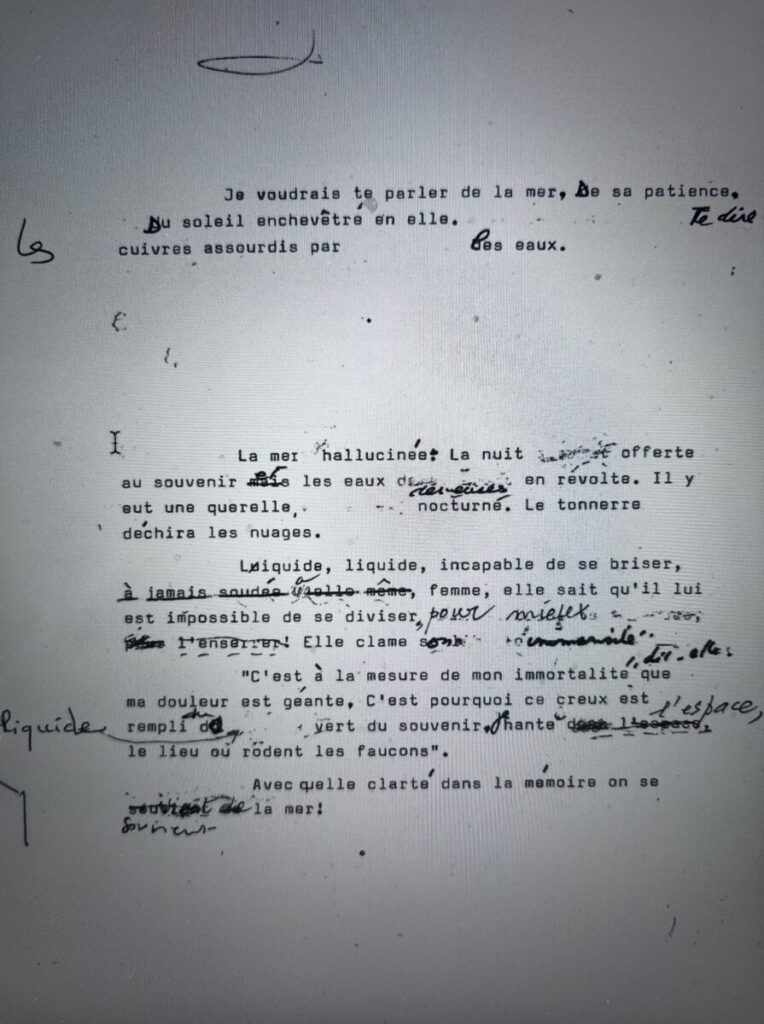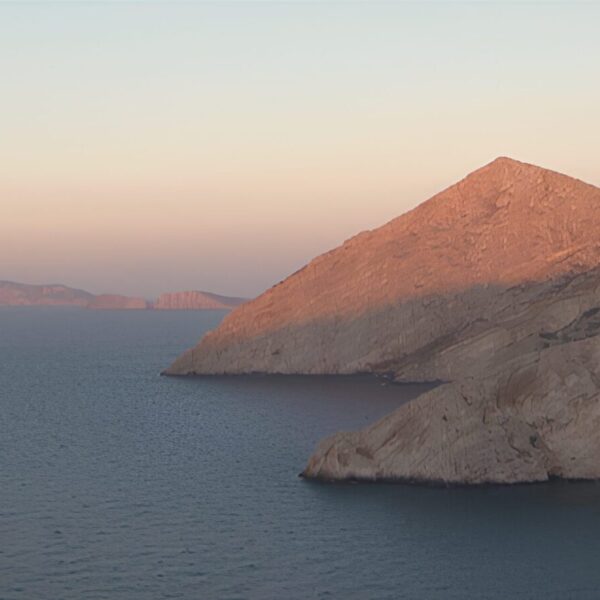Etel Adnan is an Arab-American poet, writer, and painter… the list sometimes continues with screenwriter, playwright, intellectual. In her hometown of Beirut, she spoke Turkish with her parents at home, French at school, and Arabic with her friends in the street. From a young age, she never parted with collections of French poets. Her books have been translated into many languages. Although she started painting in the United States, where she taught art philosophy classes, her works have been exhibited in the world's greatest museums and biennials, and continue to be…
Not a day goes by without me receiving communications about a new exhibition or event related to Etel Adnan, whether from a friend or an art critic, somewhere in the world. For my part, I am content with a glimpse of this information, having organized a fairly comprehensive exhibition at the Pera Museum in Istanbul in 2021, while Etel was still alive. Who knows, maybe I was influenced by Eco's testament, which advised his loved ones not to organize meetings, events, etc., about him for ten years after his death. All commemorations, posthumous writings raise the question of whether they gently distance us from the work of the departed, like a boat whose moorings are untied in a calm sea, which should not be considered an exaggeration.
This year, Etel would have turned 100. Can we celebrate the centenary of someone who has passed away? It’s almost an oxymoron… Those who remain after someone’s departure should be evaluated by staying true to the lights they cast on our dark world. It is undeniable that a considerable number of events will be organized this year in relation to Etel Adnan. Announcements of upcoming exhibitions are already starting to arrive… We will only know together to what extent what is done will reflect the "lights" she left behind.
I look at Etel Adnan's latest paintings. Patterns created with India ink. In some, writings can be seen in the background, objects on her small desk where she did all her work, like a pen, an inkwell, a vase, etc. In others, the canvas is divided in two. Below, the objects in front of the eyes (the eyes of the viewer), and above, the swirling mountains in the artist's mind… Mountains that, just like the sea, make up the Mediterranean.
Leaving Lebanon to first settle in Paris, then in Sausalito, on the west coast of the United States, at her most active time, she chose as a companion Mount Tamalpais, which stood before her. Later, she found a home from where she could see the mountain directly and settled there. What Mount Lebanon represents, which stands before you when you turn your back to the sea in Beirut, Mount Tamalpais was also on the continent across.
An Ottoman Story
Born in 1925 in Beirut to a Greek mother from Smyrna and a "Arab" Muslim father born in Damascus. In an interview we conducted in 2015, speaking of her mother, she said: "her name was Rosa Lilia Cilia Lacorte… on my maternal grandfather's side, there are Maltese who settled in Smyrna and married Greek women." She explained that her grandmother was Albanian and that her grandfather was an officer born in Antep, in the southeast of present-day Turkey, who had been assigned to Damascus. Etel was the child of a family that reflected all the diversity of an empire established in the Mediterranean. When this empire came to an end and the Republic of Turkey was founded, the La Corte brothers, who had to leave Smyrna with Etel's mother, had been like transported to the four corners of the Mediterranean, to Limassol, Alexandria, Thessaloniki, and Genoa. From what I have been told, the city of Smyrna, where Etel was registered at birth, had dispersed throughout the Mediterranean like a kind of particle effect.
Fragments of the Mediterranean
The poem I quoted above, "Sun and Sea," was written in 1949, at the age of 24. Years later, this typewritten text, never published, was given to our mutual friend, the artist Lamia Joreige, who found it in a corner of the house, and she asked him to make a video about the Mediterranean when she went to a Greek island. Then, they created a beautiful work together from this video. A wonderful canon of voices, where the sun and the sea occupy the center, accompanied by the reading of the poem by both of them. It is not only the sun and the sea. The moon was also an integral part of Etel's work, both as a planet and as a magical metaphor. It is no coincidence that she said: "When I die, the universe will have lost a friend." She was an artist rooted in reality, a person of this world in everything she wrote, drew, and said.
“You are a rogue,
said the sea, coarse,
brilliant!”
and the sun also says:
“ you are the wine of my origins,
my continents walk to fight with you
my armies, the victory of my ships!”.
(E. Adnan, Sun and Sea)
She was also the witness and the poet of the tragedy that has spread for over a century to the east of the Mediterranean. She never hesitated, not even for a single day, to cry out her revolt against the innocent blood flowing in the Mediterranean, starting with the novel Sitt Marie-Rose (1978), which tells the story of a Christian teacher killed by Christian militiamen, and which transforms the brutality that makes every neighbor a murderer. Among all the texts she wrote, I consider Arab Apocalypse to be a "masterpiece." Written between 1975 and 1976, it consists of 59 numbered poems, describing the brutal annihilation of all the oppressed in the world, a "flow poem." The true apocalypse of a geography woven with apocalyptic narratives. A prophecy from the pen of Etel fifty years ago…
XXXVI
There is a serpent hidden in the dark irritation of your eyes
There is an empire disintegrating in the fragrant mouth of Americans
There are Palestinians in the stinking waters of rivers
OUTSIDE OUTSIDE, a leash of pain around the neck of borders
Insects grafted onto bread in the ears of wheat
Sharks falling to the ground from a mad laugh on Arab boats
Blind highways in the bellies of camels
OUTSIDE OUTSIDE, the repressed promise of the spring of time
There is no rain in the flood above our plains, there are only stones
(E. Adnan, Arab Apocalypse)
After seeing an exhibition of Etel in Beirut by great chance, I did everything I could to find this book and, upon reading it, I decided to translate it. Although it seems made up of simple words at first reading, I do not forget how much I struggled to translate it, to the point of torturing myself. At that moment, I felt the need to remember the date when the poems were written and published. In the preface, I wrote that thirty-two years had passed since the publication of the book, while I still wondered with what pain these lines had been written, as if the ink were not yet dry.
All, even today, retain their freshness with their pains. That is how great masters are, their simplicity always catches us off guard.
In the Footsteps of an Exhibition
While preparing the exhibition in Istanbul, Etel was 96 years old. She had long been forbidden to travel by plane. Yet, she continued to go to work in her house in northern France or to accept writing retreat proposals in Tuscany. Once, she made a suggestion to me. I had to find a boat to come to Marseille. She would also go south from Paris, and we would go together to the city of Izmir, her mother's city, crossing more than half of the Mediterranean! I didn’t know how to respond. Etel had never seen Izmir. She left without ever going there. Yet, her mother never stopped looking towards the horizon from Beirut wondering: "Is Izmir over here?". That is why I had titled the exhibition "Impossible Return." It was not only about the city that Etel could not see, but that she could imagine through her mother’s stories, its streets, its sea, its daily life. But also, thinking of the rupture with the roots that have persisted around the Mediterranean since Homer’s Iliad, and the exile that has lasted for centuries…

Cover Photo: extracted from the Video Sun & Sea made by Lamia Joreige - (with her kind permission)
Serhan Ada is a writer and poet. He teaches cultural politics and art philosophy at Bilgi University in Istanbul. He was president of the Mediterranean Academy of Izmir in 2023-24. Among his latest books are The Year of the Tree (Essays, 2024), Childhood Objects - In the Middle of the Last Century (Essays, 2019), Time Counted Without Flowing (poems, 2019).
